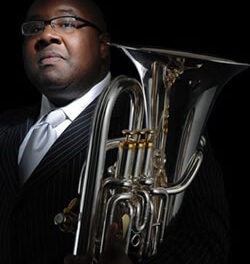Daniel Meyer and the Asheville Symphony Orchestra are on a metaphorical hitting streak. They have hit a home run with every performance this year, and on this night in Asheville’s Thomas Wolfe Auditorium they put that streak in the hands of an unlikely guest artist, percussionist Timothy Adams, Jr. A dangerous move to say the least, but coupled with the fact he was to play a recently written concerto for percussion by composer Lucas Richman, this was downright perilous. A less than typical soloist playing a less than typical piece makes for the good or the bad, or for a less than typical evening. But never fear, dear reader, for the playbook of Daniel Meyer is thicker than you think, and under his sure direction the streak would continue in grand fashion.
Opening the evening was the Overture to Mozart’s opera The Abduction from the Seraglio. A relatively short work, it served as an ideal primer for the two monuments to follow. Also, since orchestras today feel the need for thematic connections between works in a program, it acted as a great precursor to the work that would end the concert, Nikolai Rimsky-Korsakov’s Scheherazade. Meyer’s reading of the overture highlighted the stark contrasts between piano and forte. The strings were tight and controlled. Very clear, almost abrupt, lines were drawn between sections, but the sound didn’t come off as choppy; a distinct Persian mood was achieved.
Lucas Richman, who was in attendance, penned his Concerto for Percussion and Orchestra, The Healer, with the advice of soloist Adams. The composer states, “In today’s cacophony of sound environments, it is not without possibility that our inner rhythm is in constant conflict with outside influences.” The work seeks to identify those influences and resolve them through the healing power of music. When Richman asked Adams what percussion instrument best represents the role of the healer, Adams said the African log drum. Although the front of the stage was lined with instruments of different shapes and sizes to be used in the performance, this small instrument is given a position of prominence in the work. The music began with the soloist on what seemed to be a standard drum set, and as the music progressed he would get up and move to another instrument, and so on. The dissonant opening immediately displayed the virtuosity of Adams, whose arms were a blur as he kept fast, deadly rhythm. His performance on the conga drums, both with sticks and without, was nothing less than breathtaking. What was amazing is that for some of these instruments there are, of course, no musical notations, so the relationship with the orchestra has to be on the spot. In one section, Adams had been playing a long solo on one of the drums and in the midst of it Meyer led the orchestra back in. It must have taken a great deal of practice to get the cues on target for this performance, and it was well done. The Asheville Symphony Orchestra, Timothy Adams, and Lucas Richman all deserved the gracious applause the audience gave them.
Meyer chose to fill the second half of the program with one work, Scheherazade. Rimsky-Korsakov wrote the piece, based on four tales from the Arabian Nights; in the summer of 1888 around the same time he produced the “Russian Easter Overture.” It demonstrates his deep knowledge of orchestration and his penchant for dramatic music. Given the scope and breadth of the work, it is not for those with short attention spans, but by stressing the programmatic quality of the music, the ensemble kept the audience captivated throughout. They told the stories, so to speak, of Sinbad and the Kalendar Prince through music. One could imagine the boat rocking back and forth on the sea, and suspenseful, slowly cultivated crescendi created tension and dread. In the closing measures, Concertmaster Mary Byrd Daniels demonstrated poise and confidence as she single handedly ended the thrill ride through the vibrant, epic stories of ancient Persia. Despite the forty-five minutes of music that comes before, one seems to always remember that last solo section, and so the responsibility for the soloist is great.
My memory of this performance is a fond one, well done, Mrs. Daniels! And well done to all involved with this concert! The streak continued, not with a home run but with a grand slam.











